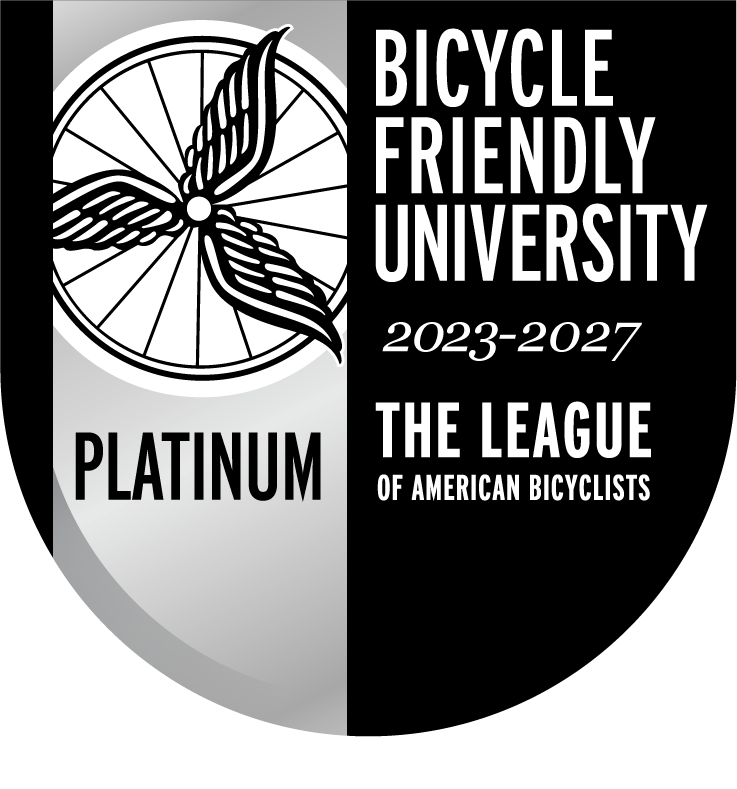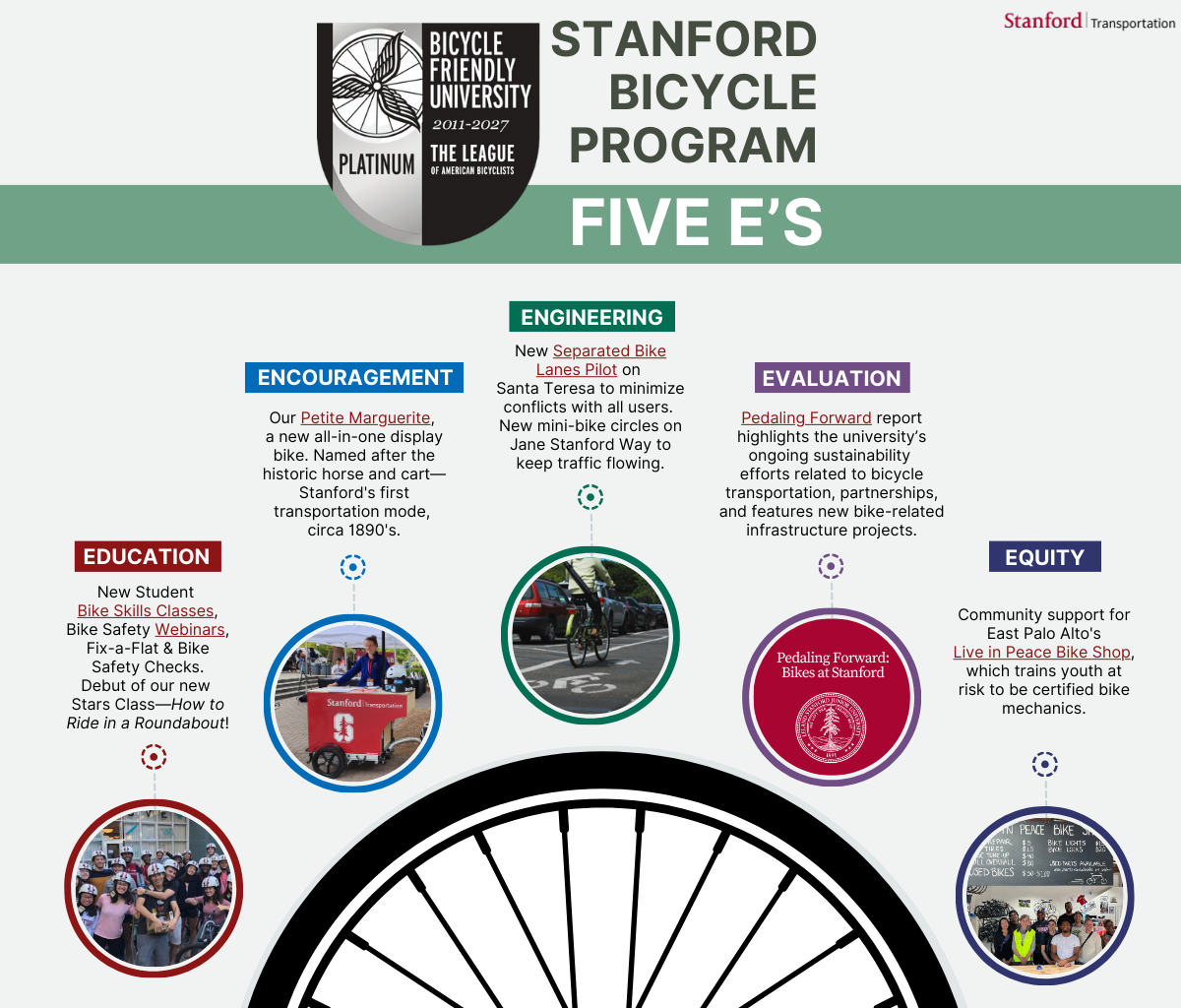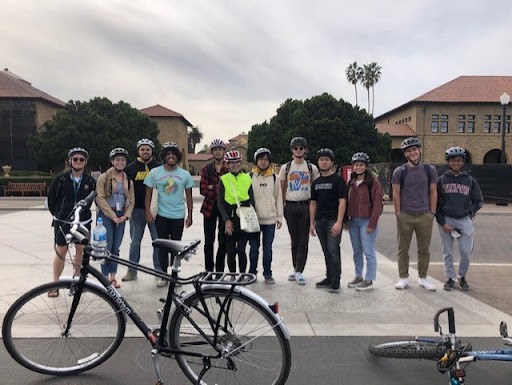[Published: October 26, 2023]
Stanford University was recognized on Oct. 26 by the League of American Bicyclists (LAB) with a record fourth Platinum Bicycle Friendly University (BFU) award in recognition of the university’s achievements in promoting and enabling safe, accessible bicycling both on campus and as a sustainable commute choice.

Stanford is one of six universities nationwide to be designated Platinum, LAB’s highest and most prestigious award level. The university was the first to be recognized at Platinum when the program launched in 2011. This most recent award extends Stanford’s original Platinum designation through 2027.
LAB, the premier grassroots advocacy organization, includes 220 exemplary colleges and universities in 46 states and the District of Columbia in its BFU program. All are taking action to address the health and environmental challenges facing America by making campuses more welcoming to bikers. LAB also awards communities and businesses certifications.
Invest in Bicycling and Great Things Happen
“The League of American Bicyclists deserves credit and our gratitude for helping to encourage change through a friendly but rigorous competition where the ultimate winners are the bicyclists,” said Brian Shaw, Executive Director of Stanford Transportation. “The university will continue prioritizing more accessible transportation infrastructure and supportive programming for all bicyclists in our Stanford community– regardless of geographical area, income level, ethnicity, or skill level."

Many Supporters & Campus Partners to Thank

“We couldn’t have received a fourth platinum status without support from the Stanford community. On any given day, sixty-five percent of student residents ride bikes on campus,” said Ariadne Delon Scott, Stanford’s assistant director of active mobility. “And this year, a record high of 22% of commuters got to work by bike–they are a huge part of our success.”
Stanford Transportation also shares this honor with the Department of Public Safety, Campus Planning & Design, Land Use & Environmental Planning, partners at the medical center, and departments and academic leadership throughout the university. “The strong collaboration we enjoy with our campus partners was key in receiving this honor,” said Scott.
Just a Few Milestones Recognized by LAB in Judging Criteria
Among the enhancements to Stanford’s bicycle program and infrastructure over the past four years that were recognized by the Platinum are:
- Increased bike parking capacity to over 20,000+ spaces. Note: current car parking taps out at 21,660.
- Supported 23 campus-wide departmental bike share programs, with 220+ bikes available to use.
- Piloted a separated bike lane on Santa Teresa Street to provide safety for motorists and bicyclists navigating a main west entry into the campus.
- Utilized Transportation Survey data to understand demographic trends in bicycle commuting and to identify focus areas to ensure that all people have access to safe bicycling.
- Launched a campus-wide Share the Road training webinar to ensure all road and pathway users display mutual respect.
- Expanded bike parking on campus, including two new bike cages (one in the planning stages) on campus to provide for our 22% of university commuters who ride bikes to work.
- Published Pedaling Forward in collaboration with Land Use & Environmental Planning. The report includes profiles of the Stanford and Stanford Redwood City campuses, Stanford Medicine and the Stanford Research Park. Pedaling Forward focuses on four areas: Sustainability; Partnerships; Diversity, Equity, and Inclusion (DEI); and Highlights from Education, Infrastructure, and Engineering.
- A key DEI finding indicates Stanford needs to direct attention and resources to ensure all campus community members have broad access to the same opportunities and benefits, including sustainable commute choices like bicycling.

Scott notes that Stanford sees more than 13,000 cyclists on campus daily. She and campus partners are committed to meeting the needs of these riders and offering bike education to increase safety and respect among all road users. Scott said, “Efforts to ensure smooth and safe circulation, provide bike infrastructure and resources, and conduct bike safety outreach are paying off. Our mode split of 22% commuting by bike inspires campuses nationwide to scale up efforts.”
“We know that when colleges and universities invest in bicycling, great things happen: We decrease our carbon footprint, improve health, increase connection to community, and promote a fun, healthy, and safe campus culture,” said Scott. “We look forward to sharing our Platinum best practices with others and continuing to learn from others. There is always more we can do and learn to improve.”
Read more about Stanford’s Platinum Bicycle-Friendly University.
